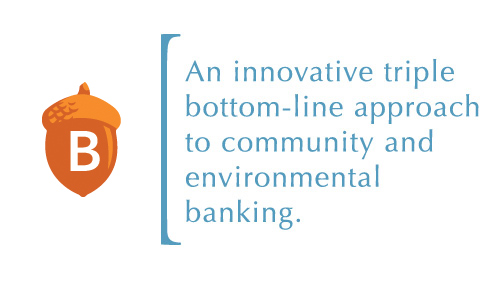About Beneficial State Bank
Beneficial State Bank (formerly One PacificCoast Bank, FSB & OneCalifornia Bank), grew from the vision of Tom Steyer and Kat Taylor and the team they formed to create a triple bottom-line bank and a supportive nonprofit foundation of the same name. In 2007, that vision was realized when OneCalifornia Bank and OneCalifornia Foundation opened in Oakland. Fashioned in the image of the great socially responsible banks and credit unions of national and international fame, the Bank is mandated to produce meaningful social justice and environmental benefits at the same time that it is financially sustainable. The Foundation owns all of the economic rights of the Bank -- when profits of the Bank are distributed, they can only be distributed to the Foundation which is mandated to reinvest those proceeds back into the communities and the environment on which we all depend. In our theory and experience, this ownership model aligns our incentives with the triple bottom line and the values of our bank customers.
In December 2010, OneCalifornia bank acquired ShoreBank Pacific and changed its name to One PacificCoast Bank. The merger greatly expanded the Bank's reach on the West Coast, and enhanced its capacity to serve its mission. ShoreBank Pacific, a pioneer of environmentally sustainable banking, began operations in 1997 in Ilwaco, Washington, at the mouth of the Columbia River, and grew to establish offices in Portland and Seattle. Joining forces with OneCalifornia Bank produced an enlarged footprint covering a bio-regional territory some call the Salmon Nation and united the forces of social justice and ecological banking.
In July 2014, One PacificCoast Bank rebranded to develop an identity that reflects their vision, mission and commitment to the triple bottom-line, rather than merely the geographical region they serve.
Beneficial State Bank, pursues economic justice and environmental sustainability by focusing on transformative sectors that need loan capital, such as:
- Affordable Housing, Multi-family and Neighborhood Stabilization
- Sustainable Food, Fisheries and Agriculture
- Low-Income Community Economic Development
- Clean Tech, Green Energy and Green Chemistry
- Women and Minority Owned Businesses
- Resource Efficiency and Conservation in the Built Environment
- Upcycling, Recycling and Repurposing
- Rural Community Development and Support of Natural Resources
- Other Commercial and Industrial
Providing credit to constructive businesses and non-profits -- especially those boosting entrepreneurial activity in inner cities, following and strengthening wellness models, or reconnecting vital rural/urban dependencies -- is their main business. Credit allows these beneficial activities to grow and scale. They also believe that a healthy environment is the only reliable foundation for economic prosperity. Finally, the Bank must be a catalyst for positive change in our communities by providing fair, transparent, and sustainable banking products and services as alternatives to more predatory practices that otherwise unwind the benefits of our lending practice.

